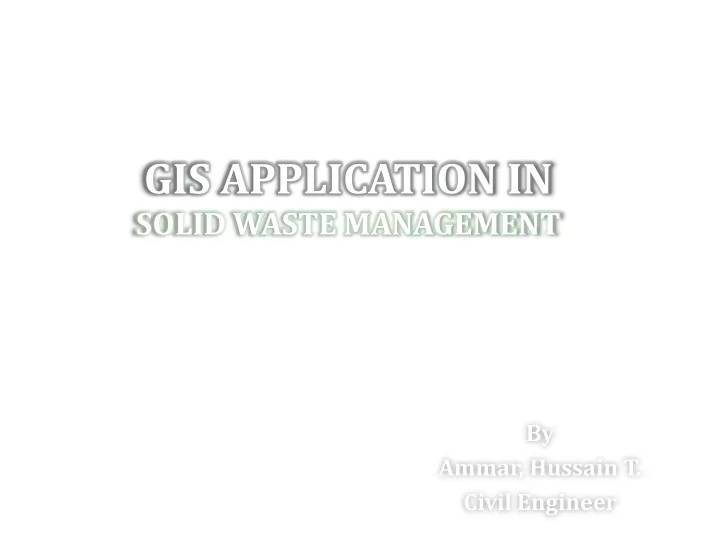

GIS APPLICATION IN SOLID WASTE MANAGEMENT By Ammar, Hussain T. Civil Engineer
CONTENT • Introduction • Need for GIS • Goal • SWM Functional Elements – Waste Storage – Waste Collection – Waste Disposal • conclusion
INTRODUCTION • SW generated from begin of humanity (natural) • Urbanization, increase population, new technology increase waste generation rate & types • SWM integral part of public health and environmental control
• Improper SWM leads to both economic & environmental suffering • Uncollected garbage leads to bad odor, growth and spread of disease, reduce market value of the area. • SW problems not only because of increase in generation, but also improper management. One of the major management issue in SWM is data management.
NEED FOR GIS • factors related to solid waste management have a spatial component as well as non-spatial data. • data and records are often lie in isolated form, difficult to assess system functionality and efficiency. • Need to manage the data in an integrated form to reduce complexity and to solve problems to various interrelated issues. • because of layers property of GIS there is least chance of confusion and error.
GOALS • To demonstrate the aid of GIS in the field of SWM. – As a decision support system – To solve SWM problems – To reduce workload – To save cost and time – To max. serviceability and profit generation
FUNCTIONAL ELEMENTS OF SWM • Waste Generation • Waste storage, handling, separation, processing at source • Waste Collection & Transfer/Transport, waste separation, processing, and transformation. • Waste Disposal
WASTE STORAGE • waste is stored in waste bins located in both sides of streets next to buildings. • Direct impact on public health. • Common problems: – Garbage are not lifted in regular intervals – Waste bins are not cleaned in regular bases. – Improper waste bin allocation • Open dumps sensitive area
CASE STUDY, INDIA • Make sure that all residents have a waste bin close to them (no open dumps) • Relocation of waste bins located in sensitive areas, e.g. close to hospital or river • Allocation of recyclable waste bins, next to waste bin
RELOCATION OF IMPROPER PLACED WASTE BINS
RECYCLE WASTE BINS ALLOCATION
WASTE COLLECTION • Complex and difficult, has about 50-70% portion of the total cost for SWM • Small change in collection practice, could results in big saving • Common problems: – No routs planning/(optimization) – No scheduling of job, and documentation
WM, INC • Provides collection service for 48 states, District of Columbia, Canada, Puerto Rico. • 26,000 collection vehicle • 80 million tons of SW/year • Serving 20 million customer • Applies GIS in 2003, and uses Network Analyst Extension + rout smart to optimize its routs and collection system
Total routs =10 Total routs =9 • • Total hours = 9 x 10 = 90 Total hours = 8 x 9 = 72 • • Avg. Yards/h = 57.06 Avg. Yards/h = 63.41 • • • in 2003, a net effect of 984 fewer routs , saving of $18,000,000
OTHER ADVANTAGES • Optimize fuel efficiency • Helping setouts by identifying their location on map • With GPS – tracking of collection vehicle (offline) • With routs shown in GIS marketing department can easily target new customers in same routs • Fewer track in the road, reduce noise and emission
WASTE DISPOSAL • Residual waste after all possible processing and transformation should be properly disposed • Open dumps cause threat to environment • Thus, waste should be disposed in managed landfill • Landfilling is the process of waste disposing, it starts with the problem of locating a landfill
CONSTRAINTS • Should have a slope lower than 40% degree • Should be kept more than 300m away from streams • Must be more than 155m from developed area • Must be kept more than 60m away from faults • Should be kept more than 60m away from water body • Must be kept more than 150m away from residence • Must be kept more than 3000m away from Hospitals
GIS INTERFACE • Developed by Ottawa University
TWO DIFFERENT MODELS
BOOLEAN MODEL
INDEX OVERLAY MODEL 0.8 0.1
Conclusion • GIS helps as a decision support system for sitting a landfill and allocating waste and recycle bins. • Also helps in rout planning and optimizing collection system which reduce workload and save time as well as cost. • Company crew could response in better time.
THANKS Q & A
Recommend
More recommend